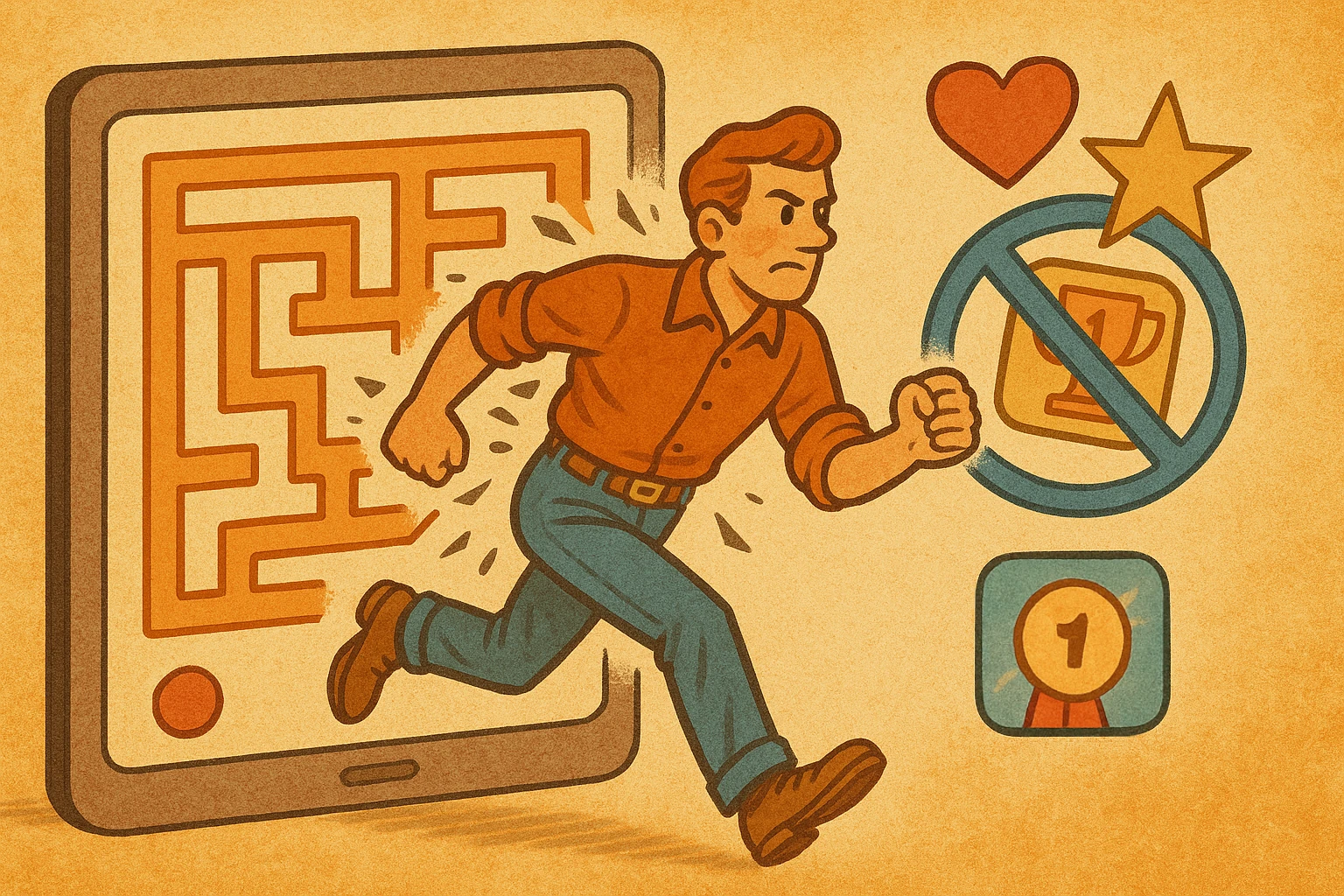Escaping the Engagement Trap: Why Karl Konnekt Rejects Gamification and Saves Your Time
 7/4/2025
7/4/2025
Introduction: Engagement at All Costs vs. “Time Well Spent”
Mobile apps today are often designed to maximize user engagement — even for routine tasks like scheduling and bookings. From endless notifications to gamified rewards, many apps deliberately try to hook you into spending more time on-screen. This engagement-first approach is so pervasive that ex-Google ethicist Tristan Harris famously described modern tech as competing in an “attention economy” — apps “trick us into paying attention to them more than we want” so our attention can be sold or monetized. While this might boost short-term metrics, it can come at a steep cost to users’ wellbeing.
Karl Konnekt takes the opposite approach. It’s a booking app designed to minimize friction and give you back time. It’s not “fun” in the sense of flashy gamification or mindless engagement — and that’s by design. Karl Konnekt wants to be delightfully boring in the best way: a warm, efficient tool you use briefly so you can get on with your life.
Why Do Apps Gamify Everything?
The Psychology and Business of Engagement
Gamification taps into core human drives — the desire for reward, achievement, status, and competition — making apps more compelling. These features trigger bursts of dopamine, which trains us to keep coming back. As one digital wellbeing expert noted, gamified apps “put users into a state of hyperarousal”.
From a business perspective, engagement means more ad views, upsells, and user data. This is the logic of the attention economy. UX practices have been borrowed from behavioral psychology and even casino models to monopolize user attention, often at the expense of well-being.
The Consequences: Screen Time, Cognitive Load, and Wellness
Modern app design often leads to increased screen time, addiction, and mental fatigue. Studies liken app dopamine loops to gambling machines. Constant prompts, decisions, and alerts create decision fatigue and stress.
Wellness advocates now promote the idea of “time well spent.” Tools like screen-time trackers and philosophies like digital minimalism (see Cal Newport) aim to help users reclaim focus and reduce digital noise.
Karl Konnekt’s Philosophy
Minimal Friction, Maximum Time Savings
Karl Konnekt is built to respect your time and attention. It avoids gamified hooks and prioritizes smooth, pleasant interactions. As Katarina Lotrič of Gentler Streak put it, Karl fosters a “soft environment, something that feels pleasant and is frictionless to use.”
No Dark Patterns or Manipulation
Karl avoids manipulative design tricks. It doesn't guilt-trip or bombard you with upsells. Instead, it trusts that value = loyalty. Its success is measured in time saved, not time spent.
Humane Design vs. Engagement-Driven UX
Design Philosophy
Karl Konnekt aligns with humane design — prioritizing real user needs over engagement metrics. As Jon Yablonski said: “We have a responsibility to prevent [products] from becoming invasive, addictive, dishonest, or harmful.”
Consumer Psychology and Trust
Loyalty stems from ease, efficiency, and reliability, not from gamification. Karl Konnekt focuses on building trust through usefulness.
Ethical Business Model
Unlike ad-supported apps, Karl Konnekt’s likely subscription-based model means its success depends on satisfaction, not screen time. This aligns its interests with users’, earning loyalty through honest value.
Competitor Comparison
Mindbody
Mindbody includes upsells, complexity, and gamified retention tools. Many solo providers find it overkill. Karl Konnekt stays lean and user-focused.
Magicline
Magicline gamifies gym visits with a loyalty points program. Karl Konnekt chooses not to gamify, betting on real loyalty via better service and simplicity.
Urban Sports Club
USC once offered a rock climbing advergame to increase app use. Karl Konnekt would never distract from your goal — it’s a tool, not a toy.
Calendly & Others
While simpler tools like Calendly lack features, enterprise apps overwhelm. Karl Konnekt fills the middle ground: complete but not bloated.
The Payoff: Loyalty Built on Respect
Quality Engagement
Saving time matters more than metrics. As one article put it: “Even the most celebrated rewards programs succeed when they enhance a strong experience.”
Case Study: Gentler Streak
Apps like Gentler Streak succeed with kind, non-addictive UX. Karl Konnekt aims to be that kind of trustworthy companion in your workflow.
Expert Endorsements
Experts like Tristan Harris and Nir Eyal support the Time Well Spent philosophy. Karl Konnekt’s design fits this movement by avoiding unnecessary interaction while still being welcoming and efficient.
Conclusion: Less Admin, More Life
Karl Konnekt rejects engagement gimmicks and focuses on what users really want: to get things done quickly and painlessly. Its approach reflects a quiet revolution in app design — one rooted in humane principles, not addictive patterns.
In the end, the best tech is often the one you barely notice — it just works. And when it’s gone, you realize how much it helped. That’s Karl Konnekt’s goal.
Sources
- The Attention Economy – Center for Humane Technology
- Bagby – The Dark Side of Gamification
- Humane Design Movement – Sketch
- CMSWire – Customer Loyalty
- StriveCloud – Gamification Examples
- Magicline – Customer Loyalty Program
- Mindbody – Progress Tracking
- Karl Konnekt – Extra Hour Survey
- On Digital Minimalism – Cal Newport
- Karl Konnekt Official Site